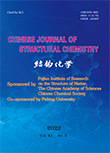Syntheses, Crystal Structures and Property of Pyridine Zinc(II) Complexes Based on Halogenated Salicylaldehyde Schiff Base
JIANG Wu-Jiu, NI Peng-Hui, MAO Fang-Fang and TAN Yu-Xing*
Chin. J. Struct. Chem. 2022, 41, 2203012-2203018 DOI: 10.14102/j.cnki.0254-5861.2011-3285
March 15, 2022
zinc complex, Schiff base, synthesis, crystal structure, property
ABSTRACT
Schiff base pyridine
zinc(II) complexes 1~4 were synthesized by the reaction of
the 2-((2-hydroxybenzylidene)amino)phenol
Schiff base with appended donor functionality, zinc acetate, and pyridine. The results of the
structural characterization of the complex show that they have the same
coordination mode and similar steric structure. Complexes 1 and 3 form a one-dimensional chain structure and two-dimensional grid structure by
lots of hydrogen bonds, respectively. Thermogravimetric analysis shows complexes 1~4 can exist stably below 150 ℃. The results of the fluorescence quenching
experiments between the complexes and DNA-EB show that the interaction between
them is intercalation, and the effect of complex 1 is the most obvious. It is speculated that the steric hindrance of
complex 1 is relatively small, and
the aromatic ring on the ligand is more likely to inserted into the base pair
of DNA.








